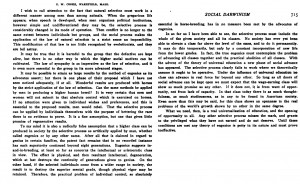Alexis Carrel, Nobel Prize Winner. Man the Unknown, 1939. [Source] A choice must be made among the multitude of civilized human beings. We have mentioned that natural selection has not played its part for a long while. That many inferior individuals have been conserved through the efforts of hygiene and medicine. But we cannot prevent …
Category: Biological Laws
“Eugenics: Its Definition, Scope, and Aims” by Francis Galton
One of the earliest, more definitive beginnings of the Eugenics movement, was this address given by Francis Galton. Eugenics got its bad rap by its association with the Nazis. Its important to observe that its most ardent proponents were Americans. “Eugenics: Its Definition, Scope, and Aims” by Francis Galton. Read before the Sociological Society at a …
Eugenics as a Religion and Social Darwinism, Collin Wells
Source: Dr. Collin Wells, “Social Darwinism” a paper presented in 1907, found in The American Journal of Sociology, pages 706-709 Finally, what is the evolutionary value of certain ideals? Let us take individualism, the ideal of democracy, which has tacitly figured in many of the phenomena to which I have already referred. Let us go …
Universal Education a Pre-Requisite for Effective Eugenics Policies
Source: G.W. Cooke, discussing ‘Social Darwinism’ in American Journal of Sociology 12 (March 1907), 714-715. Below the image is OCR scanned text. If anyone would like to send a cleaned edition, that would be greatly appreciated. I wish to call attention to the fact that natural selection must work in a different manner among men …
Separating Sex from Reproduction, the School, and the State
“The family is already being eroded by the intervention of school and state, and [the separation of sex from reproduction] might be its coup de grace.” G. Taylor, 1968
Defective Genes are Like Pathogenic bacteria and viruses the Law Must Control
As quoted in The New Diagnostics by Dorothy Nelkin and Laurence Tancredi, 1989 (pg 13-14) Although the old eugenic generalizations have been cast off, the logic behind them persists, refueled from diagnostic tests and justified in terms of efficiency, effectiveness, and cost. Thus some geneticists suggest the social importance of improving the “gene pool.” For …
Charity a Hindrance to Natural Selection
In the following foreword from a compilation of 12 eugenic lectures (1914), we see that eugenics is perceived as merely applied evolution. Furthermore, ‘modern man,’ being a sympathetic being, keeps alive those that should die. With luck, principles of breeding already used with animals will be brought to bear on humans. ——————- Foreword by Lewellys …
The Geneticists Manifesto (1939) or Social Biology and Population Improvement, by H.J. Muller
Social Biology and Population Improvement (aka, the Geneticist’s Manifesto) by H.J. Muller [Source #1, Source #2] The Seventh International Congress of Genetics adjourned at Edinburgh only three days before World War II got under way. It is interesting to recall that just before the shooting started a group of geneticists at that Congress-informally formulated what …
Eugenics Quote of the Day: ‘Defective (ie, ‘disabled’) people should not be allowed to reproduce for the good of the state.’ RZ Mason, mayor of Appleton, WI
R.Z. Mason, mayor of Appleton, WI, “The Duty of the State in its Treatment of the Deaf and Dumb, the Blind, the Idiotic, the Crippled and Deformed, and the Insane.” [Source] In the progress of modern civilization, the state has come slowly to a recognition of certain duties and obligations to these unfortunate classes. At …
The Duty of the State in the Treatment of the Deformed: R. Z. Mason, Appleton WI, 1879
R.Z. Mason, mayor of Appleton, WI, “The Duty of the State in its Treatment of the Deaf and Dumb, the Blind, the Idiotic, the Crippled and Deformed, and the Insane.” [Source / Italics added, bold text added] In the progress of modern civilization, the state has come slowly to a recognition of certain duties and …
- 1
- 2


Recent Comments